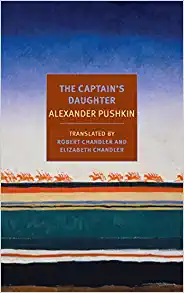The Captain’s Daughter by Alexander Pushkin
Writers and editors are often asked to name their favorite novel but seldom are asked to name their favorite short story. This fact may be determined by the short story’s brevity and that there are many more “perfect” short stories than there are “perfect” novels. Then again novels are not necessarily called “perfect” but rather just “great,” and it is generally agreed that greatness does not preclude having flaws. All this notwithstanding, “favorite” implies a subjective point of view; and yet I think for most readers it’s difficult to choose a single short story that lives on in one’s mind above all the rest. But I actually have an all-time favorite, the only short story I continuously and ritually reread about once a year. This is The Captain’s Daughter by Alexander Pushkin.
 It’s a rather long short story that takes place in 19th Century Russia, narrated from the point of view of Pyotor, a 17-year-old boy whose father sends him to join a military regiment. En route to his military service, Pyotor befriends a man whom he meets later on leading a group of rebellious soldiers that take over the fort where Pytor is stationed. The rebel ends up executing all the men in Pyotor’s regiment but spares the young soldier’s life.
It’s a rather long short story that takes place in 19th Century Russia, narrated from the point of view of Pyotor, a 17-year-old boy whose father sends him to join a military regiment. En route to his military service, Pyotor befriends a man whom he meets later on leading a group of rebellious soldiers that take over the fort where Pytor is stationed. The rebel ends up executing all the men in Pyotor’s regiment but spares the young soldier’s life.
While stationed at the regiment, Pytor falls in love with Masha, the daughter of an innkeeper and grows determined to marry her. But because his life has been spared, when the rebel leader is later caught and executed, Pyotor is suspected of being a traitor against holy Russia and is imprisoned. His beloved Masha then goes to Saint Petersburg to petition Catherine the Great for his release.
While the narrative of The Captain’s Daughter has many delicious twists and turns, the strongest elements are its atmosphere and characters. Most of what happens is set in motion by a blizzard that falls on Pyotor as he and his man-servant are making their way toward the regiment’s outpost.
“I was approaching my destination. Around me stretched a wild and dreary desert, intersected by little hills and deep ravines. All was covered with snow. The sun was setting. Our wagon was following the narrow road, or rather the track, left by the sleds of the peasants. All at once my driver looked round, and addressing himself to me—
“Sir,” said he, taking off his cap, “will you not order me to turn back?”
“Why?”
“The weather is uncertain. There is already a little wind. Do you not see how it is blowing about the surface snow?”
“Well, what does that matter?”
“And do you see what there is yonder?” The driver pointed east with his whip.
“I see nothing more than the white steppe and the clear sky.”
“There, there; look, that little cloud!”
I did, in fact, perceive on the horizon a little white cloud which I had at first taken for a distant hill. My driver explained to me that this little cloud portended a blizzard. I had heard of the snowstorms peculiar to these regions, and I knew of whole caravans having been sometimes buried in the tremendous drifts of snow. Savéliitch was of the same opinion as the driver, and advised me to turn back, but the wind did not seem to me very violent, and hoping to reach in time the next posting station, I bid him try and get on quickly. He put his horses to a gallop, continually looking, however, towards the east. But the wind increased in force, the little cloud rose rapidly, became larger and thicker, at last covering the whole sky. The snow began to fall lightly at first, but soon in large flakes. The wind whistled and howled; in a moment the grey sky was lost in the whirlwind of snow which the wind raised from the earth, hiding everything around us.”
Reading this very simple yet powerful description brings the reader right to the steppe, gives a sense of the vastness of the Russian landscape. But the wild wonder of this scene is also an atmospheric reflection of what will go on in the story, the wild overwhelming actions of rebellion and the eventual calm that must ensue.
A striking similarity in the work of Pushkin and Tolstoy and even Dostoyevsky is an ability to suggest the complex world of nature, society and social and political standing with precise, spare, simple language. And it makes you realize that the best writing is almost like alchemy: a few details can speak volumes. I find that much contemporary writing does just the opposite: detail after detail is delivered in a kind of onslaught, leaving nothing to the imagination. The object may be clarity but the end result is, ironically, obfuscation. When I reach this point, either in reading published or unpublished work, I find myself longing to go back to reading Pushkin.
This article appears courtesy of Delphinium Books, BookTrib.com’s latest content partner.
Buy this Book!
Amazon







